Friday Feb 27, 2026
Friday Feb 27, 2026
Thursday, 31 December 2020 00:20 - - {{hitsCtrl.values.hits}}
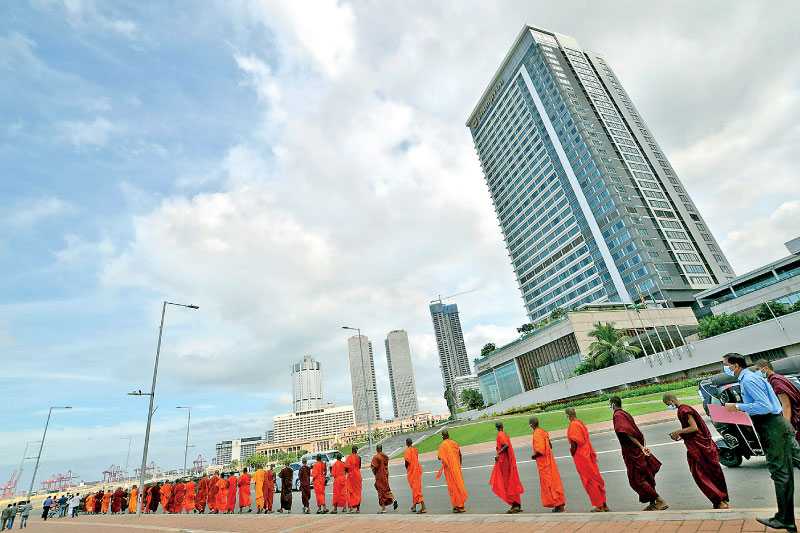
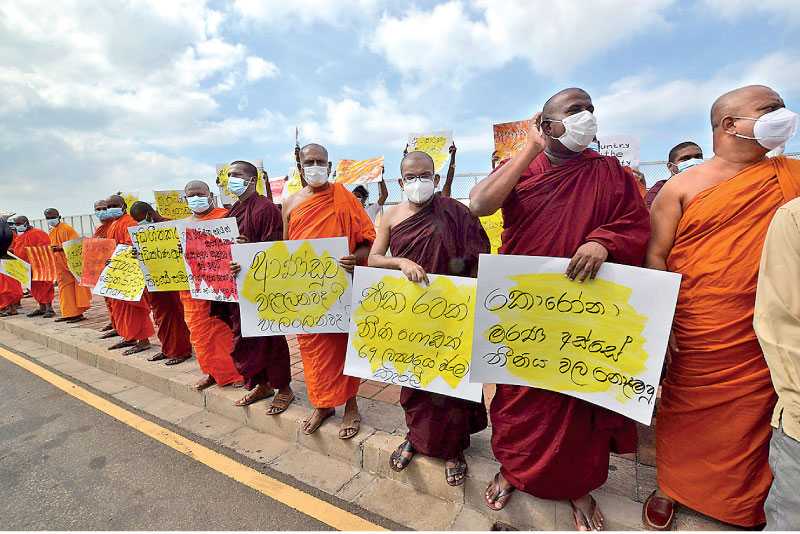
It is one thing to dog-whistle racism and religious chauvinism when you are an Opposition personality; it is another thing when Sinhala-Buddhist racism unchecked by you rears up and lashes out violently at minorities, on your watch. Whoever you may try to pin the rap on after the conflagration, the frame-up lacks credibility and ricochets as rebellion – Pix by Shehan Gunasekara
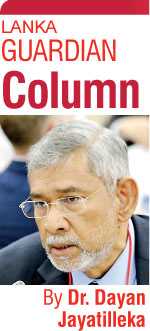 The ultranationalist Buddhist clergy has commenced a two-pronged campaign: (a) against burials and for cremation of COVID-19 victims, a policy that is mandatory only in a handful of the UN’s 193 countries, and (b) against Provincial Councils and the holding of Provincial Council Elections before the promulgation of a new Constitution. Justice Minister Sabry was a target of the agitated monks.
The ultranationalist Buddhist clergy has commenced a two-pronged campaign: (a) against burials and for cremation of COVID-19 victims, a policy that is mandatory only in a handful of the UN’s 193 countries, and (b) against Provincial Councils and the holding of Provincial Council Elections before the promulgation of a new Constitution. Justice Minister Sabry was a target of the agitated monks.
These formations of the Buddhist clergy have long been part of President Gotabaya Rajapaksa’s support base, by their own public admission and easy public (facial) recognition. They are also close to radical-nationalist Cabinet Ministers.
It is one thing to dog-whistle racism and religious chauvinism when you are an Opposition personality (JR against the B-C Pact 1957) or are in the Establishment, with extra-systemic religio-racist fans whose campaigns are amplified by the local Fox News while someone else is the Presidential human shield taking the electoral rap.
It is another thing, as President Jayewardene realised (1983-’87) having indulged racist Minister Cyril Mathew, when Sinhala-Buddhist racism unchecked by you rears up and lashes out violently at minorities, on your watch. Whoever you may try to pin the rap on after the conflagration (JRJ pinned it on the JVP), the frame-up lacks credibility and ricochets as rebellion.
Geneva portal
The Gotabaya regime is mimicking Trump/Netanyahu: boosting the hardcore chauvinist base by pandering to its worst prejudices and maintaining rigidly hawkish policies. Colombo is still living on Trump time. In the New Year the global clock will reset to Biden-Harris time.
For Sri Lanka, 2021 will be the Geneva Year. “By oneself is one defiled” as the Buddha said. So far, the Gotabaya regime has done much to damage its case in Geneva and continues to do so.
Geneva is the portal to the global “lawfare” battlespace. A post-20th Amendment presidency may think itself unaccountable, but domestic impunity and immunity don’t hold globally. The previous UN Human Rights High Commissioner Zaid al-Hussein left a timebomb ticking in his report: the conclusion that the Sri Lankan justice system is not independent enough to secure accountability and the recommendation that therefore the 193 member states of the United Nations should initiate prosecutions under the doctrine of universal jurisdiction.
Courts and legislatures throughout the world cannot be deterred by domestic claims of the absolute sovereignty of the nation-state.
Furthermore, the incoming US administration’s stated determination to revive democracy globally may focus also on Sri Lanka. Sri Lanka is the place where the two trends that the Biden-Harris administration opposes actually converge: Trump-type ultranationalist/racist authoritarianism and China’s perceived new propensity to ideologically export its domestic model of governance.
A campaign for democracy has little chance of success against long-established authoritarian systems, but the odds are considerably better when the task is to interrupt the transition, or degeneration through subversion from above, by a regime, of a long-established democracy such as Sri Lanka. 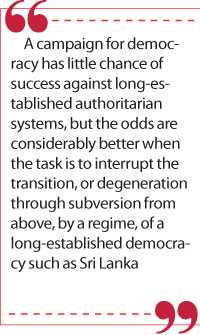
Nailed it
Here’s my choice of The Sri Lankan Quote of the Year:
“…We have experts in the field, but none of them has been called for discussions. On the other hand, this is a virus, but as far as I know, there were no virologists in the committees that were set up. When you’re trained in a particular discipline you get to know all aspects of it and be able to adapt it to suit the problem. We should have made use of the trained personnel we have, but the idea that it should be done by people with connections is the kind of thinking we have” – Daily Mirror, “There were no virologists in the committees set up” – Prof. Vitharana.
Instead of “training” and experience in “a particular discipline”, the guiding principle is that even in this great emergency of a pandemic, things “should be done by people with connections”. What sort of connections? Those of a military ‘old boys network’ and the regimental tie? The new Deputy Chairman of the Ceylon Electricity Board is a retired military officer who is not from the Engineering Corps (it would have made sense if he were) and is Chairman of a business group.
Under President Gotabaya, militarisation is eating through the long-established civilian public administration like the armyworm eating through crops.
Prof. Vitharana reveals more: “The Government also wanted to take credit and said we have controlled the situation…From there it flared up again and that led to the so-called second wave.”
“…There should have been a much bigger allocation for COVID-19 and its consequences…The bulk of the budget should have been for that. I would have put long-term ventures on hold and given priority to the immediate needs of the people…” (Ibid)
Economic Dhammika Paniya
The economic crisis is inevitable because the regime’s economic doctrine of a ‘self-sufficient national economy’ is the equivalent of the Dhammika Paniya, the syrup of the Shaman from Kegalle.
It is inevitable also because of the intellectual poverty of the economic debate in the political sphere.
The Government’s doctrine of “self-sufficiency” is constantly invoked but has no internationally recognised intellectual authors or texts invoked as points of reference. The only references from the Government ranks are strictly local: former Prime Minister Sirimavo Bandaranaike and former Finance Minister, Dr. N.M. Perera. That’s like invoking the Titanic as a model for sailing.
The Sri Lankan economic policy debate among the political elite takes place in a time-warp, with the references dating back to the 1970s and 1980s. There is no grasp of the pandemic, its economic consequences and the changes in economic thinking the world over.
Progressive economic thinkers and policy makers have responded to two shocks, firstly that of the neonationalist-unilateralist backlash against neoliberal globalism, a backlash which weakened the old globalist model, and secondly the COVID-19 pandemic. The pandemic broke the global supply chains, necessitating nationalist economic strategies centring on domestic production. The pandemic also proved that the model which leaves much to the market and private profit, exposed its weaknesses in protecting public health and safety and therefore the economy.
Thus, there has been much new thinking and suggestions for rational, progressive reforms of the domestic economic orders and the global economic order.
The right is wrong
Typically, Sri Lankan politicians, academics and ideologues have been behind the curve. Some make the error of regarding domestic production not as a necessary adaptive policy and desirable corrective to and within globalisation, but as a model in and of itself. The Sri Lankan Government belongs in that category. Others in politics, think-tanks and respected websites, hanker after the restoration of the old model of neoliberal globalisation.
While the neoconservative Alt-Right Gotabaya regime has no international intellectual underpinnings or examples for its ‘Jathika Arthikaya/self-sufficiency’ doctrine, the neoliberal globalist Right in Sri Lanka, as I have noticed from its spoken/published/posted discourse, absurdly spends its firepower today attacking the policies of an intellectual giant, Raul Prebisch.
The neoliberal Economic Right is unaware that the place of a thinker in any realm, including development economics, depends on what he meant in his/her time and place, how he/she advanced the state of thinking and policy at that time; the contribution he/she made to the history of thought in that particular discipline or domain. That assessment must not be confused with the issue of whether that economic doctrine should have been continued beyond a certain period, still less with the question of whether or not it should be returned to under very different circumstances.
So it is with Raul Prebisch, a titan of development thinking; a man whose ideas emancipated and revolutionised thought. He brought into view the fundamental phenomenon of dependency of the Latin American and other Third World economies which functioned as the ‘periphery’ of the world economy, on the ‘centres’ of the global system, the North; dependency that had been created by violent colonialism and neocolonialism; dependency that ensured a continued outflow of ‘surplus’ through multiple means to the North thereby causing the loss of surplus necessary for industrialisation and resulting in underdevelopment as a continuing process.
The policy intervention of Prebisch and the Economic Commission of Latin America (ECLA) was intended to reduce the outflow of surplus and retain it for industrialisation, which it did with relative success for a period. In some cases, it was overthrown after rightwing military coups and in others grew outmoded as does any economic policy regime. However, the great positive contribution to the history of ideas—in contradistinction to the continued relevance as policy—of Prebisch and ECLA is recognised by every serious economic thinker, teacher or student.
What makes the demonisation of Raul Prebisch by the Sri Lankan neoliberal Economic Right which persists today despite the fall of the Ranil-Mangala administration, a cause for sadness and incredulity, is the sheer ignorance of the history of the serious development policy debate in Sri Lanka and the internationally recognised contribution of Sri Lanka to the development policy debate.
The two Sri Lankans most respected internationally in the realm of development thinking were both very conscious of the path-breaking contribution of Raul Prebisch and ECLA to the struggle against underdevelopment. These two personalities did not by any means belong to the United Front administration of Prime Minister Sirimavo Bandaranaike and participants in the policy regime of Dr NM Perera. These two Sri Lankans were the brains of the economic planning process of the UNP government of Prime Minister Dudley Senanayake—though it was the top politicians rather than they who decided the dominant economic policy overlay. I refer to Dr. Gamini Corea, later Secretary-General of UNCTAD and later still, head of the South Center in Geneva and his cerebral deputy, Godfrey Gunatilleke.
At UNCTAD and the South Center, Gamini Corea continued in the great tradition of Raul Prebisch who had been the founder Secretary-General of UNCTAD, grappling with the issue of ‘unequal exchange’ (Arghiri Emmanuel) through the terms of trade. Upon return from Geneva, Dr. Corea was founder-chairperson of the Institute of Policy Studies (IPS) in Colombo while Godfrey Gunatilleke had founded the MARGA Institute for development studies in the 1970s.
Many international roundtable conferences on development thinking were initiated by the MARGA Institute and presided over by its chairperson Godfrey Gunatilleke, including a conclave which had luminaries from the global South, Rodolfo Stavenhagen and Juan Somavia.
This effort resulted in an intellectually path-breaking volume standing in precise paradigmatic contradistinction to the thinking of Milton Friedman and the Chicago Boys who were advising the Pinochet military dictatorship and advocating policies of which the contemporary Sri Lankan rightwing economists are descendants. This landmark volume was unambiguously entitled ‘Another Development: Approaches and Strategies’ (1977) edited by leading ‘dependency’ economist Fernando Henrique Cardoso, who as President of Brazil went on to establish a stellar economic record of macroeconomic stability.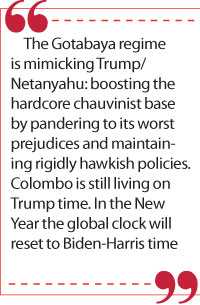
Development discourses
Sri Lanka’s neoliberal Right takes unwarranted pride in the UNP’s economic track-record. Unwarranted, because the polarising character of the economic policies of UNP governments taken together with the no less polarising ethnic and economic policies, combined in a toxic cocktail which always caused a populist backlash which was often, but not always nationalist or even xenophobic.
The UNP in 1952-1956 triggered a mass uprising (the 1953 Hartal) and then, Sinhala Only. In 1965-1970 it caused the rise of the JVP and an electoral landslide for the SLFP-Left coalition. In 1977-88, it contributed to a violent Southern uprising. In 2001-2003 it led to the ouster, electoral defeat and the first Rajapaksa victory. In 2015-2019, it produced Gotabaya Rajapaksa and a parliamentary tsunami which drowned the UNP.
The weight of evidence shows something radically wrong in the UNP’s economic orthodoxy. The sole exception to this rule was the Premadasa presidency which achieved the economic miracle of combining high growth, high foreign investment, a vibrant stock market, reduced inequality and a real transfer of income to the lower income groups. Radically course-correcting the Open Economy while based upon it, Premadasa scornfully rejected the SLFP’s Closed Economy model. His was an alternative development discourse.
Here’s an example:
“The exploitation which leads to poverty is endemic in the structure of international economic relations today. That is why this structure has to be changed. That is why we talk of a New International Economic Order. It is an order where human rights are respected; where economic inequalities and poverty are eliminated; where malnutrition and illiteracy are removed.
“I am not talking of a new order which must exist between nations and nations only. We have to institute this order in our own countries…We cannot have a New International Economic Order abroad and an Old Economic Order of exploitation at home. We cannot ask for the removal of exploitation and inequalities among nations and allow economic oppression and disparities to flourish within our nation.
“The emancipation of mankind from exploitation must take place both nationally and internationally. The structural imbalances and inequalities within nations are linked together. That is as true for the south as it is for the north” – Ranasinghe Premadasa, Udagam Udanaya, 23 June 1987.
This extract from a speech by Prime Minister Premadasa contained in Udagam Udanaya, the publication distributed at the commencement of every Gam Udawa to the hundreds of thousands who attended. The discourse sounds to me much more in the tradition of Raul Prebisch and the school of thought he founded, than Hayek, Friedman and Hausmann. Premadasa was the policy practitioner par excellence of the paradigm of ‘Another Development’.
Ranasinghe Premadasa’s pitch for an equity-based new domestic economic order also accords perfectly with the ideas urged on Prime Minister Wickremesinghe in 2015 by Nobel Prize winner for Economics, Prof Joe Stiglitz, while sharing a platform in Colombo. His presentation on taking equity as the key link of a post-conflict economic development strategy for Sri Lanka was reproduced on his website at Harvard. The UNP and its supportive civil society economists ignored this economic doctrine in 2015 and adopted a contrary economic vision which contributed to the party’s extinction. Even today, para-UNP economic ideologues avoid reference to the Stiglitz episode.
Columnists have remarked on restiveness on the neonationalist flank of the Opposition, signalling a possible New Right ‘spoiler’ presidential bid. This is a reflex-action of impatience, frustration and (typically) ego-centric adventurism provoked and permitted by the stubbornly persistent free-market fundamentalism of some Oppositionists.
The new Opposition must educate itself about the history of the development discourses in Sri Lanka, including those of our finest developmental minds, all three of whom either served under a UNP administration or headed one: Gamini Corea, Godfrey Gunatilleke and of course, Ranasinghe Premadasa—whose son leads the UNP’s successor party and the new Opposition.
A good start would be ‘Towards a Sri Lankan Model of Development’ a collection of writings (1975-2015) by Godfrey Gunatilleke, especially Part 5, entitled ‘A Vision for Sri Lanka 2025 & 2035: Sri Lanka’s Transition from High Human Development to Very High Human Development’. Given that today’s New Opposition should aim to win the Presidency and the Parliament by 2025, this text would outline a progressive goal and roadmap.